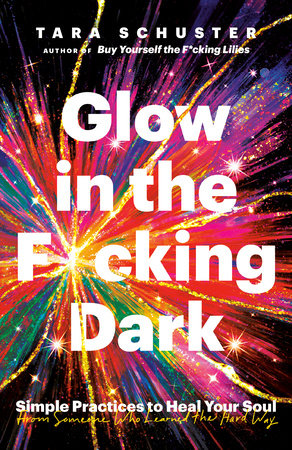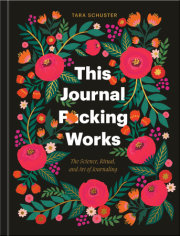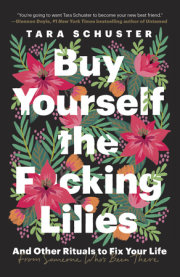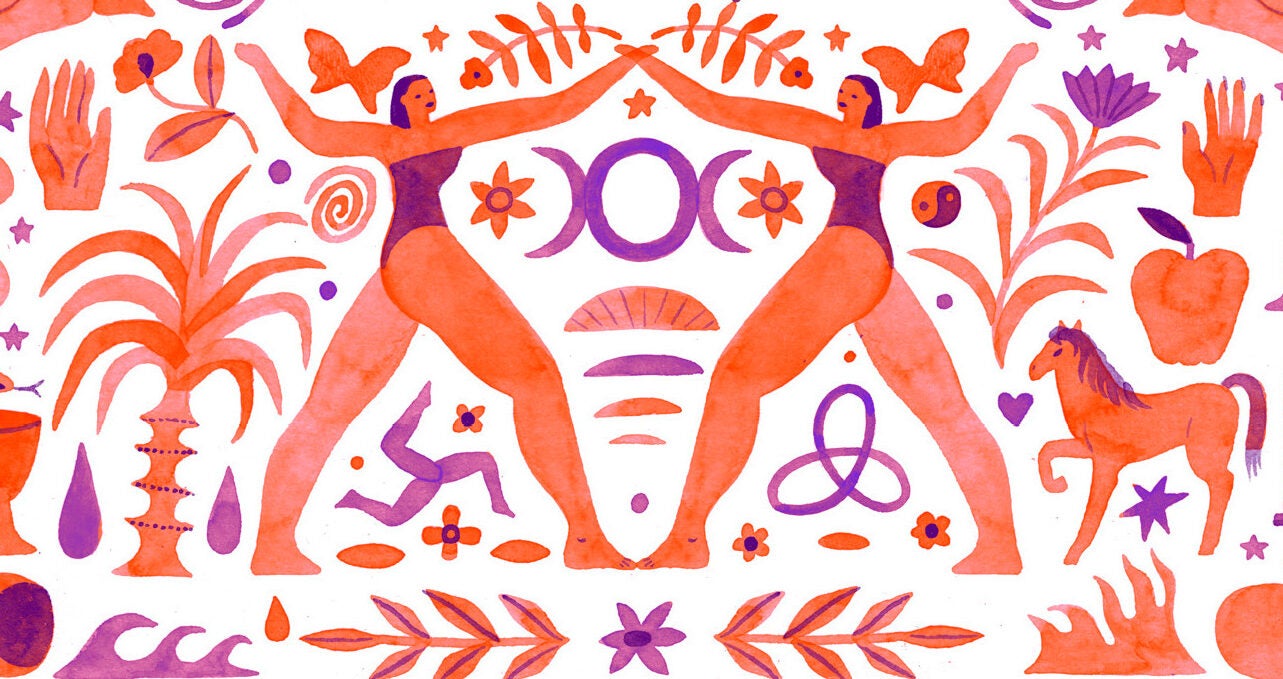Tro-mah
If It's Hysterical, It's HistoricalThe first time I heard someone earnestly use the word “trauma,” I was on a date with a guy I met on the Internet. I had sneaked my way into an invite-only celebrity dating app where I had options for potential dates like, “DJ slash Instagram influencer slash model” and “~~REDACTED te” Not only had I tricked the app into thinking I was worthy of people who listed their profession as “founder,” I had even secured my first date and found myself sitting across a wooden bistro table from a bona fide Hot Person: an actor who was professionally attractive. As someone who usually dates “interesting” to “sickly looking” people, this was a revelation. A verified, blue-checked Hot Person! A tall Australian with a tousle of strawberry blond bangs swooping over his glasses and an accent that could melt the artisanal butter right off your gluten-free bread.
As we discussed the menu, I felt those I wanna get close to your skin butterflies. Flustered by his attractiveness, I hastily ordered the first item, a cold kale salad with dried cranberries (???). I tried to recover from my incredibly lame, not-enough-food order by asking for the dressing on the side and a cup of water with no ice (again: ???), as if complicating the order made it better. Nothing says romance like cold kale (that was for sure going to end up stuck in my teeth), dressing on the side, and lukewarm tap water.
As we exchanged our getting-to-know-you questions (“Where are you from? Who do you hate?”), I asked him what he was currently working on. He explained that he was in between seasons of his hit biker/zombie/apocalypse TV show and was taking this hiatus to work on a documentary. “I’m looking into how tro-mah affects every single part of our lives. You look at the root causes of war, you look at how people mistreat one another, and usually, all our issues stem from tro-mah. Mom who has severe anxiety and gives it to her children? Tro-mah. Dad who is abusive to his kids and was abused himself? Tro-mah. And then there is cultural tro-mah! The Holocaust, the political system, discrimination and oppression. We soak in that tro-mah every day.”
Eh . . . Did I miss something here? What was “tro-mah”? I wondered as I looked into his unreasonably blue eyes. (HOW WERE HIS EYES THAT BLUE? HOW DO SOME PEOPLE GET BORN LIKE THIS?!) It took me a minute to come out of my swoon and realize that the word “tro-mah,” without a bewitching Australian accent, was English for “trauma.” Trauma.
Oh God. No. I felt a full-body revulsion as if my eyes might roll so hard into the back of my skull that they would come loose and drop down my throat like errant pinballs, only to land somewhere in the pit of my stomach. We all have our shit, but do we really need to dwell on it? Is EVERYTHING really “trauma”? This feels indulgent. Just moments ago, I had been thinking about how to ask this gorgeous specimen to come over to my place for a post-salad snuggle. Now, I just wanted to get the f*** away from him.
I wrapped up the date as quickly as possible, oddly insisting that I had an early meeting the next day (I did not—it was Saturday), and that this, in some ways, was a work dinner (it definitely was not and framing it that way was highly problematic). I flagged down our waitress and, without waiting for the bill, reached for my credit card so that we could expedite the process. My wallet, however, had other ideas. I was so flustered that I ripped the tab off the zipper and was now unable to open it. I grasped at the brass nub, but it wouldn’t budge. I picked up a butter knife and jammed it into the track, trying to jimmy it loose. With pity in his eyes, the hot Australian looked at me, the wallet with a knife in it, and said sweetly, “I can cover your salad.”
Back home, I had two major realizations. The first was that kale salad is not dinner. If I order a kale salad without any protein for dinner, then I will be inhaling an entire frozen pizza two hours later. The second, and marginally more important, realization was that I had clearly been set off by the word “trauma.”
As is my custom when I have an intense and inexplicable reaction to something, I sat down on my aggressively floral duvet, picked up my journal with a cover illustration of the Trevi Fountain depicted in delicate detail, and let my favorite white-and-gold pen investigate. As I wrote, I found myself proclaiming, “I didn’t have it that bad! I have no right to trauma. Trauma is for other people who have really SUFFERED. I just had a kinda consistently bad childhood. Why is everyone so sensitive? Why does everyone have ‘issues’? AND, let’s say that some things, for me, were a little on the ‘traumatic’ scale, well f*** that! I have already done SO MUCH WORK. THERE CAN’T BE ANYTHING LEFT TO DO. IT WOULDN’T BE FAIR!!”
Wow, I thought, reading my scribbled temper tantrum. The lady doth protest too much, methinks. If the mere suggestion that trauma could play an unconscious role in people’s lives—the dude had never said anything specific about me—forced me to skip a potential make-out sesh with a legitimately paid-to-be-handsome person, then I knew there was definitely something to unpack.
Even though I had been in therapy off and on for ten, fifteen, twenty years, there were certainly some feelings and memories that lingered that I wished didn’t exist. At some level, I understood that they affected my present life, but mostly, I ignored them, thinking that they weren’t “important” or “big” enough to be addressed. They played like a program I neglected to shut down, running in the background of my computer screen, invisible behind all of the windows and tabs I had open, but sucking down my emotional battery nonetheless. I called this cluster of bad feelings and memories “the Thing.” It was like a cloud, a sequence of hard-to-swallow moments from my early childhood that I had absolutely no interest in revisiting. But every now and then, they would visit me, unannounced and certainly unwelcomed. Rude.
Recently, they found me on my first “post-pandemic” outing, when I attended a reading for a new poetry book about how love is an act of resistance in late-stage capitalism. Or something like that. In any event, I think that’s what they were talking about because I know NOTHING about “late-stage capitalism,” and I have to confess, I am barely interested in the topic. But the guy I was dating knew the author, and a poetry reading seemed like a pretty soft launch into the post-quarantine world.
We were on the back “patio” (converted parking lot) of a dive bar. Everyone’s outfits seemed strange, like people were deciding what fashion was for the first time and the decision was chunky sneakers, giant flood-leg pants, and crop tops. After a pandemic, what you wear on your first outing is a statement, and I was not here for these statements. And honestly, why are crop tops a thing? How can you charge me for a full shirt when a quarter of it is missing? OH GOD, WRITING THIS MAKES ME FEEL SO OLD. To be fair, however, I have always hated crop tops, even when I was young enough to wear them. Though I did partake in the Baby-T Movement of the 1990s, my chubby little belly spilling out from under a T-shirt that read da brat, in giant block letters. But I digress . . .
The plastic tables and chairs had, in my estimation, been set up incorrectly—way too close together, not socially distanced at all. The stage was wrong, too, directly adjacent to the sidewalk and street, so the author had to compete with the loud conversation of a family trying to decide if they were parking in a legal space. “Well, what does the sign read?” a man barked, totally unaware that on the other side of the wooden fence, an audience of seventy was straining to hear the poet passionately discuss “social contractions.” “I don’t know, it’s confusing, ‘No Parking Anytime,’ but two-hour parking seven a.m. to six p.m.? What does that mean? Is it no parking or some parking?” A woman tried to decipher this Rosetta stone of municipal regulations. I had no idea what the f*** anyone was talking about, either with the parking or the post-sovereign precepts. It did not help that the speaker was also, tragically, stationed directly next to the open-air “kitchen” of a hot dog roller and French fry stand. Every time an order was ready, a waiter had to walk across the stage with trays of fried food. It was a shit show.
Copyright © 2023 by Tara Schuster. All rights reserved. No part of this excerpt may be reproduced or reprinted without permission in writing from the publisher.








